#the adventures and memoirs of sherlock holmes
Photo
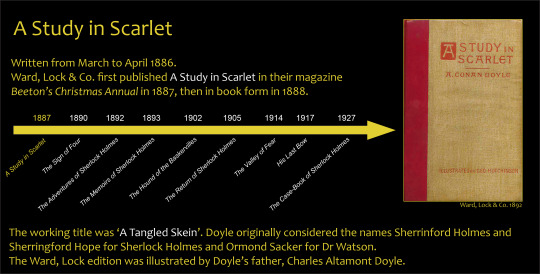
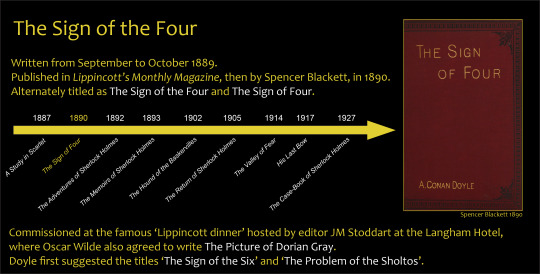
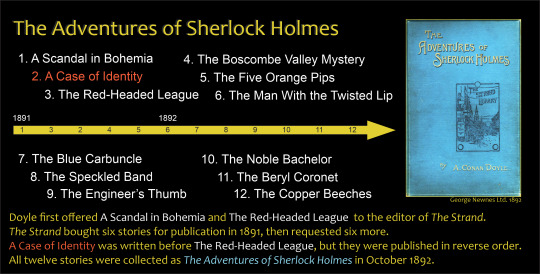
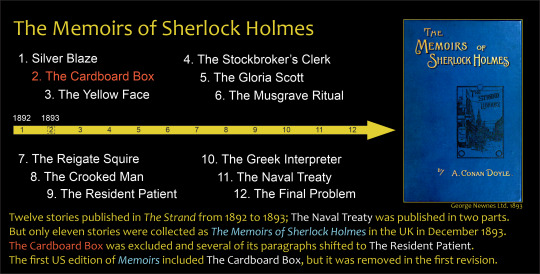



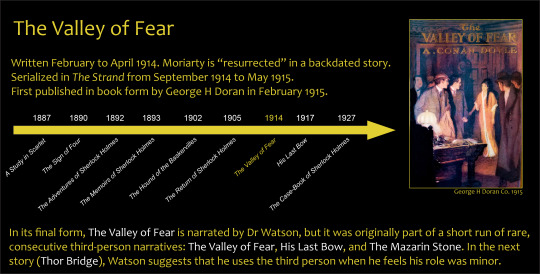
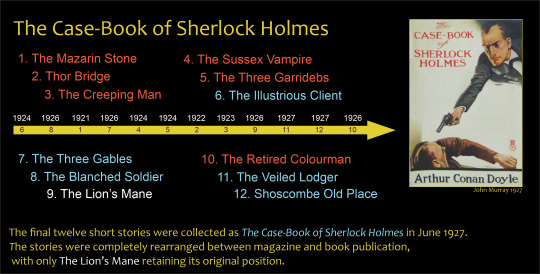
By the Book | A Sherlock Holmes publication timeline
Note: Numbered lists indicate the writing and magazine publication order, which were usually the same (exceptions noted). Timelines indicate the book order or the story order in each collection. Until His Last Bow, stories were usually (not always) spaced one month apart. There was usually (not always) a lag time of about one month between UK and US publication. Stories were not always published in the UK first. Book covers represent the first hardcover editions. Red titles indicate a story was positioned later in a collection relative to its writing order, blue titles earlier.
#Sherlock Holmes#Arthur Conan Doyle#ACD#publication timeline#chronology#A Study in Scarlet#The Sign of the Four#The Adventures of Sherlock Holmes#The Memoirs of Sherlock Holmes#The Hound of the Baskervilles#The Return of Sherlock Holmes#His Last Bow#The Valley of Fear#The Case-Book of Sherlock Holmes
377 notes
·
View notes
Text

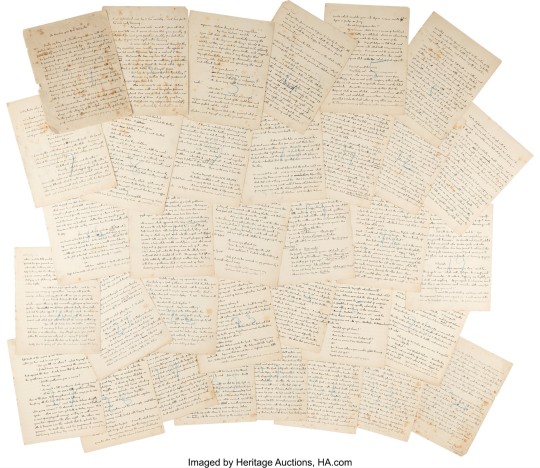
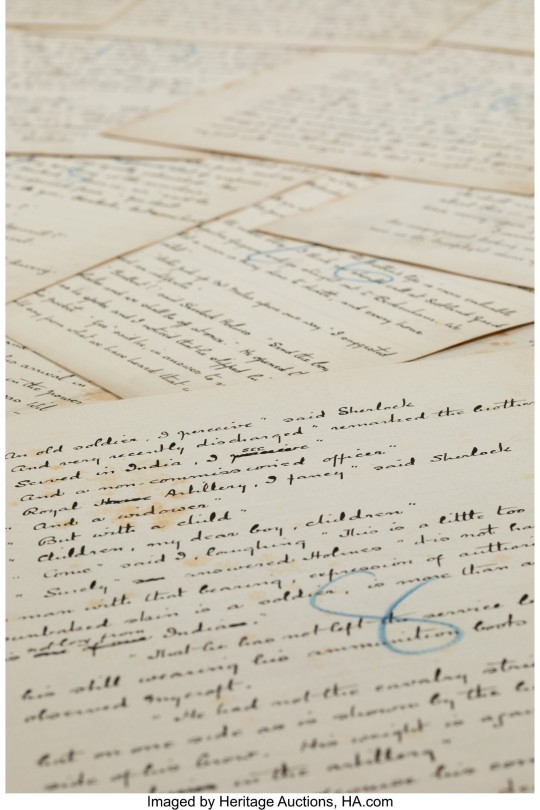
The original 1893 manuscript for "The Adventure of the Greek Interpreter" from "The Memoirs of Sherlock Holmes" by Sir Arthur Conan Doyle
#sherlock holmes#acd#sir arthur conan doyle#conan doyle#arthur conan doyle#the adventure of the greek interpreter#gree#the memoirs of sherlock holmes#sherlock holmes manuscript#holmes#manuscript#1893#antiques#victorian
28 notes
·
View notes
Text
Watson: I am begging you, please clean up. Even just putting away a couple of papers.
Holmes:

#musgrave ritual#the musgrave ritual#sherlock holmes#john watson#the adventures of sherlock holmes#I am having SUCH a good time#the memoirs of sherlock holmes
63 notes
·
View notes
Text
Okay so I wanna rant about one of my current hyperfixations: Sherlock Holmes. This post is in reference to two of my favourite details from the original books, and by "details" I mean "inconsistencies" (for lack of a better term lmao) that I would otherwise hate in a series but for some reason I find it hilarious in this context (the context to me being that Doyle didn't even want to be writing about Sherlock—his true passion was spiritualism—but the public was like no, we want our asshole detective)
(Analysis under Read More cause this ended up being way longer than I'd intended. It wound up taking over an hour and several frantic google searches but it was worth it.)
First off, does Watson know who Moriarty is or not? Now this one is slightly more annoying but not too important. Like I understand from a writer's perspective (needing a reason to explain/counter something) but I still think it's strange.
In The Valley of Fear, Watson does in fact know who Moriarty is.
"You have heard me speak of Professor Moriarty?”
“The famous scientific criminal, as famous among crooks as—”
“My blushes, Watson!”
(Book: The Valley of Fear, published 1915. Source: Project Gutenberg.)
Countering Watson's pevious statement in The Vally of Fear, he later does not know who Moriarty is.
“You have probably never heard of Professor Moriarty?” said [Holmes].
“Never.”
(Book: The Final Problem, published 1893. Source: Project Gutenberg.)
While it is true The Final Probelm was published before The Valley of Fear, the stories are out of order and should be read as The Valley of Fear then The Final Problem/The Memoirs of Sherlock Holmes. Based on this, Watson should’ve known who Moriarty was (or at least have heard of him.) But in the grand scheme of things, this slight error is really not that important and something I just found fascinating.
However, there is another inconsistency in the same two books that I think is absolutely hilarious. Similar to the last, it isn't super important, just something that I'd noticed.
In The Valley of Fear, Sherlock talks to Watson and Inspecter McDonald (an underrated character, I absolutely love him) about Moriarty and his evil criminal empire.
“I happen to know who is the first link in his chain—a chain with this Napoleon-gone-wrong at one end, and a hundred broken fighting men, pickpockets, blackmailers, and card sharpers at the other, with every sort of crime in between."
(Book: The Valley of Fear, publish 1915. Source: Project Gutenberg.)
Amidst that myriad of insults, one stands out the most: "this Napoleon-gone-wrong." That might be the best insult I've ever read (followed closely by Holmes describing Moriarty's eyes/features as being "peculiarly reptilian.") Of course I'm stating this for a reason as Sherlock directly contradicts himself later in The Final Problem:
"He is the Napoleon of crime, Watson. He is the organizer of half that is evil and of nearly all that is undetected in this great city. He is a genius, a philosopher, an abstract thinker. He has a brain of the first order."
(Book: The Final Problem, published 1893. Source: Project Gutenberg.)
How can one be both a "Napoleon-gone-wrong" AND "the Napoleon of crime?"
Anyways, this was just a long-winded post of me ranting about details I noticed while reading. These aren't concrete statements either, I haven't read all the books so I probably missed something. This is all in good humour so please don't kill me. I'm going to attempt to do the read more break but idk if I'll be able to but I shall try lmao. Should I post more of these analysis type posts? Cause I love making them and I have a lot of thoughts on everything. But if you've read this far, thank you ❤ have a great day/night wherever you are, love you :)
#sherlock holmes#professor moriarty#the adventures of sherlock holmes#the valley of fear#the final problem#the memoirs of sherlock holmes#moriarty the patriot#yuukoku no moriarty#yuumori#william james moriarty#james moriarty#sir arthur conan doyle#i think i did the read more and am Very Proud of myself#this only took like an hour and several frantic google searches
59 notes
·
View notes
Text

“What is the meaning of it, Watson?” said Holmes solemnly as he laid down the paper. “What object is served by this circle of misery and violence and fear? It must tend to some end, or else our universe is ruled by chance, which is unthinkable. But what end? There is the great standing perennial problem to which human reason is as far from an answer as ever.” - The Adventure of the Cardboard Box
#the adventure of the cardboard box#bbc sherlock#sherlock holmes#the universe#memoirs of sherlock holmes
2 notes
·
View notes
Text
"A Journey Through Memoirs: Exploring Sir Arthur Conan Doyle's 'Memories and Adventures'"

Sir Arthur Conan Doyle's "Memories and Adventures" offers readers a fascinating glimpse into the life and times of one of the most celebrated authors of the 19th and early 20th centuries. Through a series of captivating anecdotes and reflections, Doyle invites readers to accompany him on a remarkable journey through his personal and professional experiences, providing invaluable insights into the man behind the iconic literary creations.
Spanning a wide range of topics, from Doyle's childhood memories to his adventures as a medical student and his later career as a renowned author, "Memories and Adventures" offers a multifaceted portrait of a complex and multifaceted individual. Doyle's prose is engaging and conversational, drawing readers into his world with warmth and sincerity. Whether recounting his early days as a struggling writer or sharing anecdotes about his encounters with famous figures of the era, Doyle's narrative style is both engaging and illuminating.
One of the most striking aspects of "Memories and Adventures" is Doyle's candidness and self-awareness. Throughout the book, he reflects on the highs and lows of his life with honesty and humility, offering readers a rare glimpse into the inner workings of his mind. From his struggles with writer's block to his doubts about the literary merits of his most famous creation, Sherlock Holmes, Doyle's reflections are refreshingly candid and introspective.
At the heart of "Memories and Adventures" lies Doyle's enduring passion for adventure and exploration. From his travels across the globe to his adventures in the realm of spiritualism and the supernatural, Doyle's life was marked by a restless curiosity and a thirst for knowledge. His accounts of his travels to far-flung destinations such as Africa, Australia, and America are filled with vivid descriptions and colorful anecdotes, transporting readers to exotic locales and distant lands.
In addition to his adventures in the physical world, Doyle also delves into the realm of the imagination, sharing insights into his creative process and the genesis of some of his most beloved works. From the inception of Sherlock Holmes to the inspiration behind his historical novels and supernatural tales, Doyle offers readers a behind-the-scenes look at the making of a literary legend.
In conclusion, "Memories and Adventures" is a captivating and deeply personal memoir that sheds new light on the life and legacy of Sir Arthur Conan Doyle. Through his engaging prose and candid reflections, Doyle invites readers to join him on a journey through the highs and lows of his remarkable life, offering a rich tapestry of anecdotes, insights, and adventures along the way. Whether you're a fan of Sherlock Holmes or simply curious about the man behind the myth, "Memories and Adventures" is sure to delight and inspire readers of all ages.
Sir Arthur Conan Doyle's "Memories and Adventures" is available in Amazon in paperback 18.99$ and hardcover 25.99$ editions.
Number of pages: 498
Language: English
Rating: 9/10
Link of the book!
Review By: King's Cat
#Sir Arthur Conan Doyle#Memoirs#Autobiography#Adventure#Exploration#Literary career#Sherlock Holmes#Writing process#Personal reflections#Childhood memories#Medical studies#Spiritualism#Supernatural encounters#Travel#Global adventures#Africa#Australia#America#Creative inspiration#Historical novels#Short stories#Novels#Literary legacy#Authorial struggles#Writer's block#Intellectual pursuits#Personal challenges#Fame#Success#Legacy
2 notes
·
View notes
Text
In the Adventures and the Memoirs of Sherlock Holmes, in the first short story John Watson describes him as "the most perfect reasoning and observing machine" and in the last one as "the best and wisest man whom I have ever known".
God I love the character growth they both have.
#sherlock holmes#arthur conan doyle#john watson#the adventures of sherlock holmes#the memoirs of sherlock holmes#johnlock
8 notes
·
View notes
Text
Today marks the 135th anniversary of Arthur Conan Doyle's novel, A Study in Scarlet. The book that introduced Sherlock Holmes and his partner John Watson. I remember reading this iconic novel for the first time and I was instantly hooked right at the beginning when our characters first met.
Sherlock Holmes is a detective that stands out from the rest of them because he uses his knowledge of various subjects when making observations and deductions involving a case. However, his creative use of logic in human behavior doesn't improve his social skills or lack thereof. In fact, he doesn’t really know or care to know how to interact with people, while his partner and roommate, John Watson, is the only exception.
As the narrator of the series, Watson does share his criticisms of Holmes especially with his idiosyncrasies and generates the same level of interest in his friend’s investigative qualities. And it is through this backdrop of Watson's narration that we, the readers, hold the same fascination and love for Holmes just as Watson does.
After reading 4 novels and 56 short stories, I have learned two things. First, I was drawn to Sherlock Holmes weaknesses just as much as his strengths because his flaws were just as relatable to all of us. And second, I was intrigued by the boundless relationship of Sherlock Holmes and John Watson. It is quite remarkable that a friendship of such different personalities had the potential to endure the highs and the lows through the test of time. Effectively, their partnership struck a cord as one of the earliest bromances to be brought forth from the page.
Based on these reasons, the series of Sherlock Holmes stands out from the mystery genre not only for its detective stories but also for its character development and human relations. To this day, Arthur Conan Doyle's beloved series continues to be reprinted around the world and displayed on the screen many times.

#sherlock holmes#a study in scarlet#the sign of four#the adventures of sherlock holmes#the memoirs of sherlock holmes#the hound of the baskervilles#the return of sherlock holmes#the valley of fear#his last bow#the casebook of sherlock holmes#arthur conan doyle#sherlock#holmes#john watson#books & libraries
16 notes
·
View notes
Text
"A Journey Through Memoirs: Exploring Sir Arthur Conan Doyle's 'Memories and Adventures'"
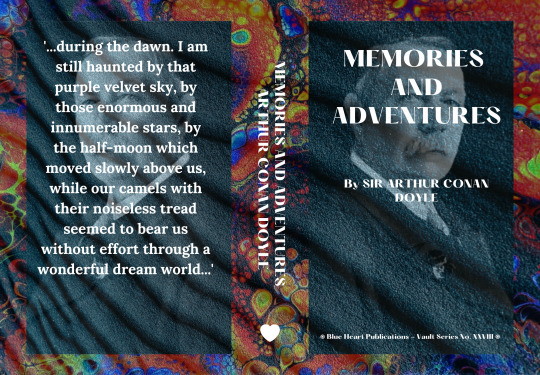
Sir Arthur Conan Doyle's "Memories and Adventures" offers readers a fascinating glimpse into the life and times of one of the most celebrated authors of the 19th and early 20th centuries. Through a series of captivating anecdotes and reflections, Doyle invites readers to accompany him on a remarkable journey through his personal and professional experiences, providing invaluable insights into the man behind the iconic literary creations.
Spanning a wide range of topics, from Doyle's childhood memories to his adventures as a medical student and his later career as a renowned author, "Memories and Adventures" offers a multifaceted portrait of a complex and multifaceted individual. Doyle's prose is engaging and conversational, drawing readers into his world with warmth and sincerity. Whether recounting his early days as a struggling writer or sharing anecdotes about his encounters with famous figures of the era, Doyle's narrative style is both engaging and illuminating.
One of the most striking aspects of "Memories and Adventures" is Doyle's candidness and self-awareness. Throughout the book, he reflects on the highs and lows of his life with honesty and humility, offering readers a rare glimpse into the inner workings of his mind. From his struggles with writer's block to his doubts about the literary merits of his most famous creation, Sherlock Holmes, Doyle's reflections are refreshingly candid and introspective.
At the heart of "Memories and Adventures" lies Doyle's enduring passion for adventure and exploration. From his travels across the globe to his adventures in the realm of spiritualism and the supernatural, Doyle's life was marked by a restless curiosity and a thirst for knowledge. His accounts of his travels to far-flung destinations such as Africa, Australia, and America are filled with vivid descriptions and colorful anecdotes, transporting readers to exotic locales and distant lands.
In addition to his adventures in the physical world, Doyle also delves into the realm of the imagination, sharing insights into his creative process and the genesis of some of his most beloved works. From the inception of Sherlock Holmes to the inspiration behind his historical novels and supernatural tales, Doyle offers readers a behind-the-scenes look at the making of a literary legend.
In conclusion, "Memories and Adventures" is a captivating and deeply personal memoir that sheds new light on the life and legacy of Sir Arthur Conan Doyle. Through his engaging prose and candid reflections, Doyle invites readers to join him on a journey through the highs and lows of his remarkable life, offering a rich tapestry of anecdotes, insights, and adventures along the way. Whether you're a fan of Sherlock Holmes or simply curious about the man behind the myth, "Memories and Adventures" is sure to delight and inspire readers of all ages.
Sir Arthur Conan Doyle's "Memories and Adventures" is available in Amazon in paperback 18.99$ and hardcover 25.99$ editions.
Number of pages: 498
Language: English
Rating: 9/10
Link of the book!
Review By: King's Cat
#Sir Arthur Conan Doyle#Memoirs#Autobiography#Adventure#Exploration#Literary career#Sherlock Holmes#Writing process#Personal reflections#Childhood memories#Medical studies#Spiritualism#Supernatural encounters#Travel#Global adventures#Africa#Australia#America#Creative inspiration#Historical novels#Short stories#Novels#Literary legacy#Authorial struggles#Writer's block#Intellectual pursuits#Personal challenges#Fame#Success#Legacy
0 notes
Text
lol THIS ENDED UP BEING SO LONG but it's such a cute story opening that I had to draw Watson roasting Holmes's messiness for the newspaper and Holmes skillfully maneuvering his way out of having to do chores. It's all canon, even the indoor sharpshooting, except for the bit about the cold bath.
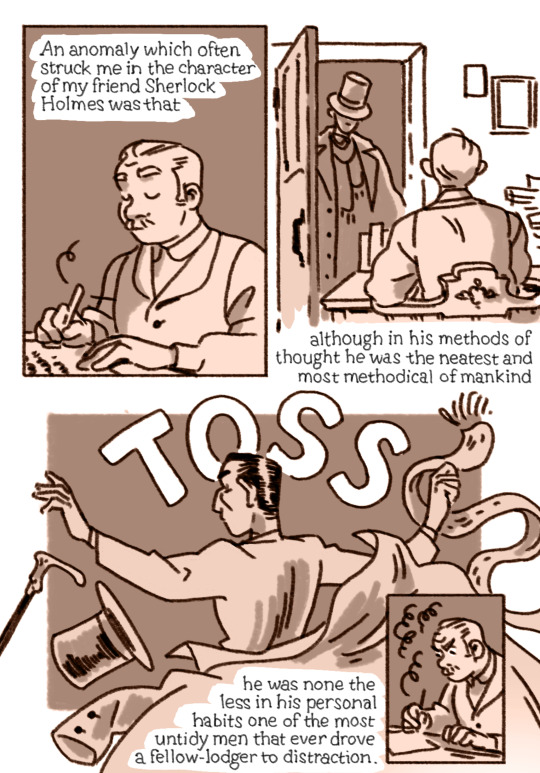
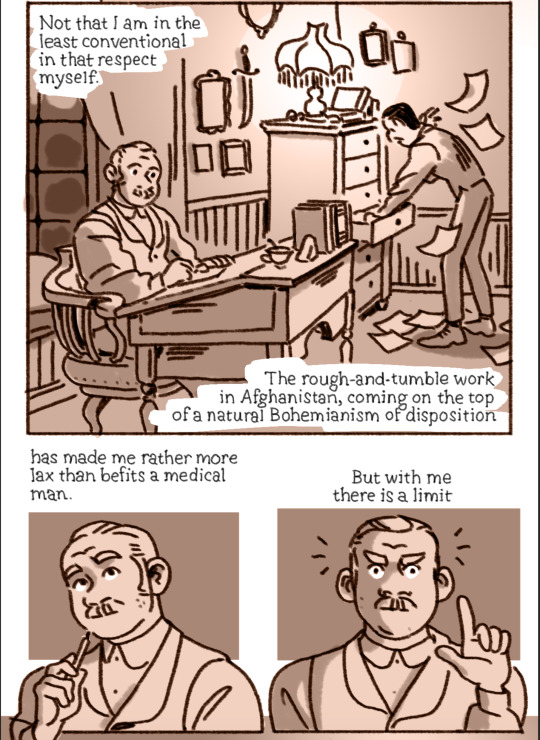
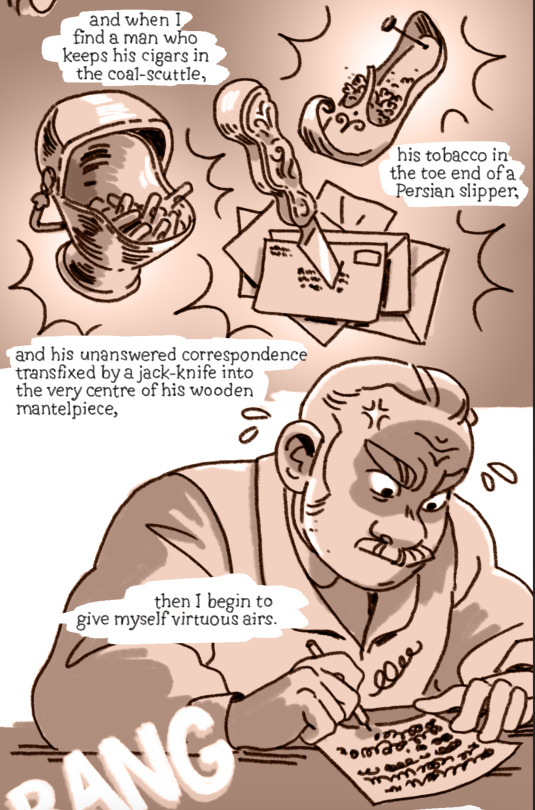
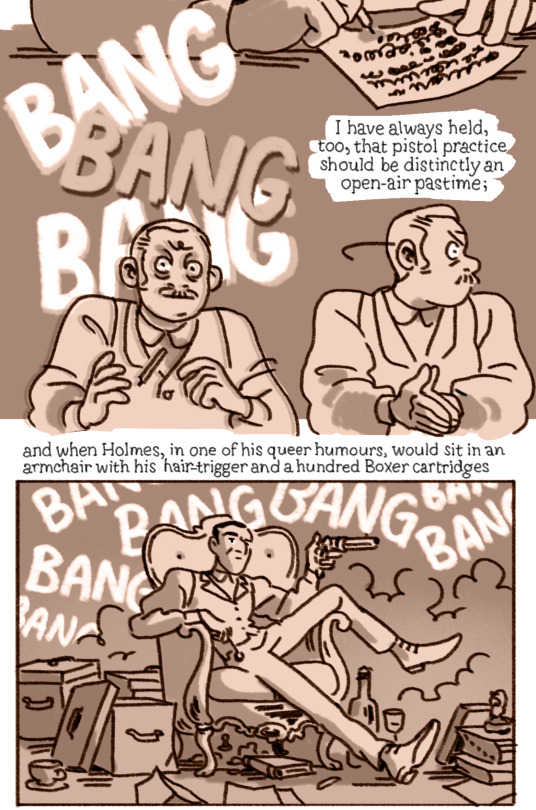
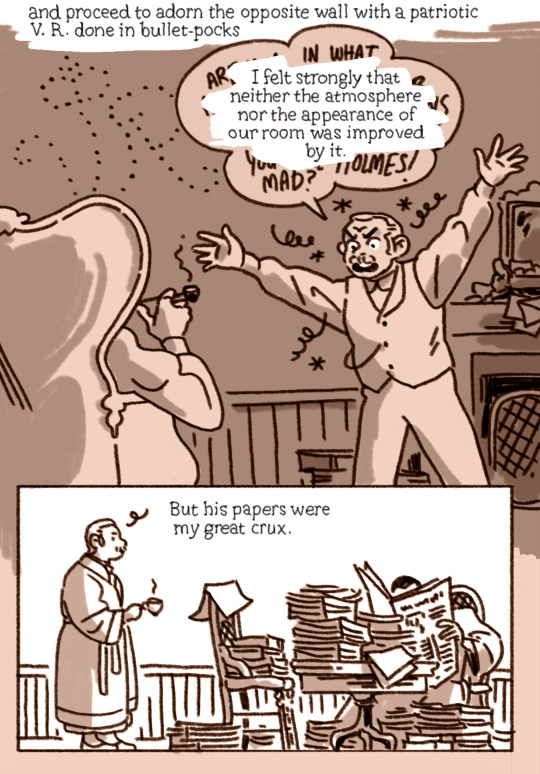
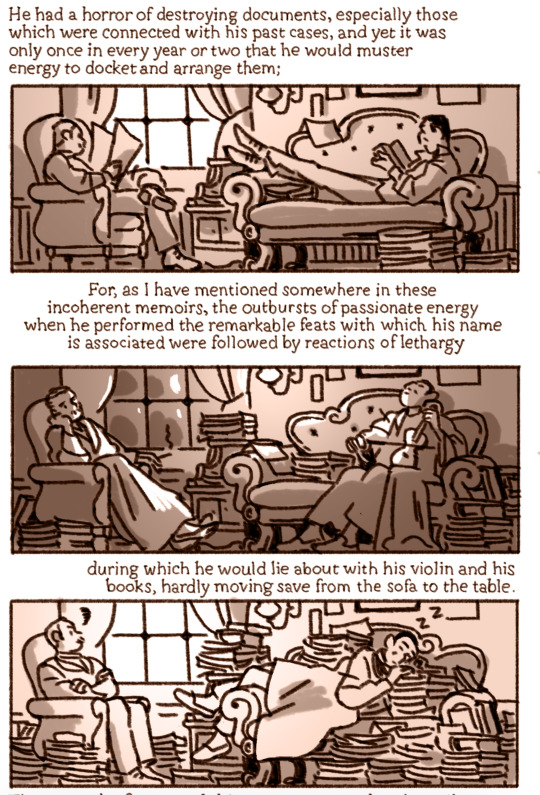
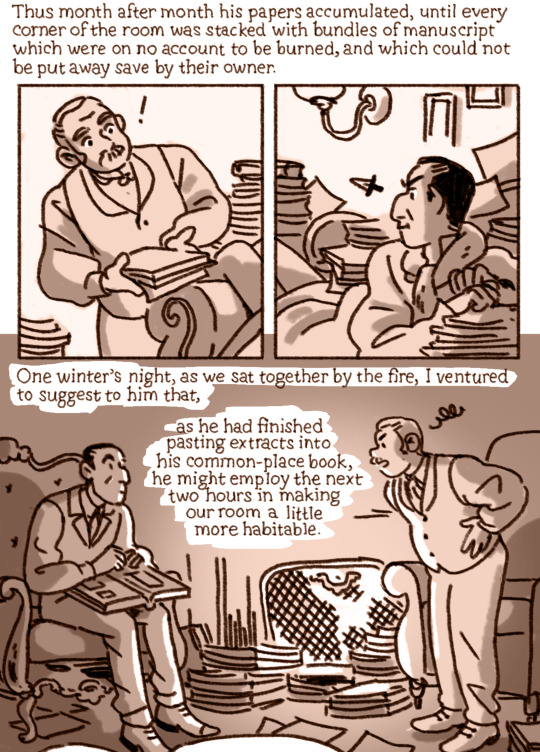
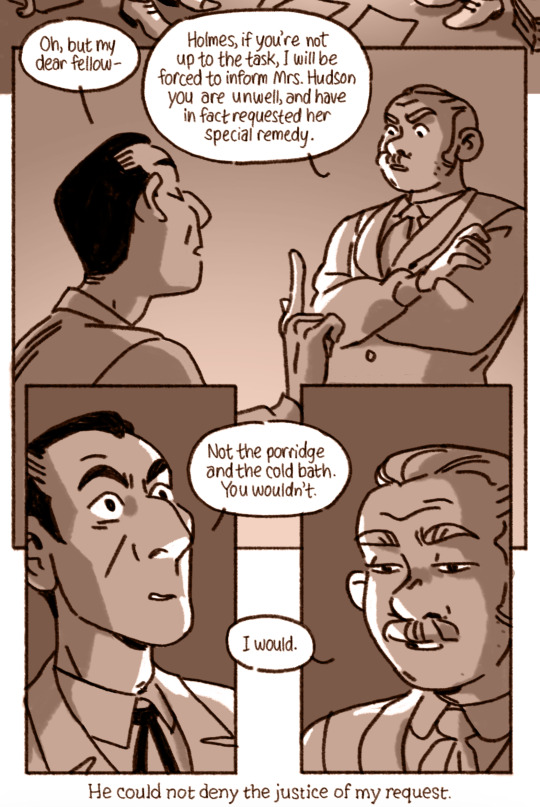
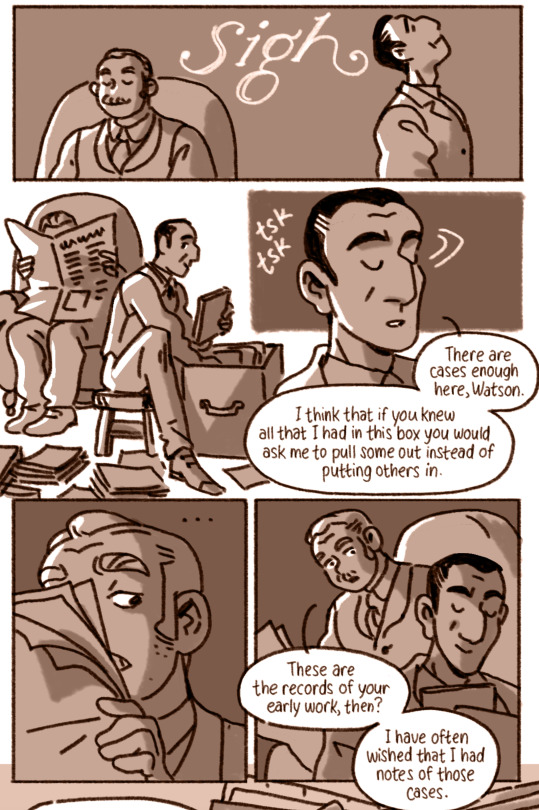
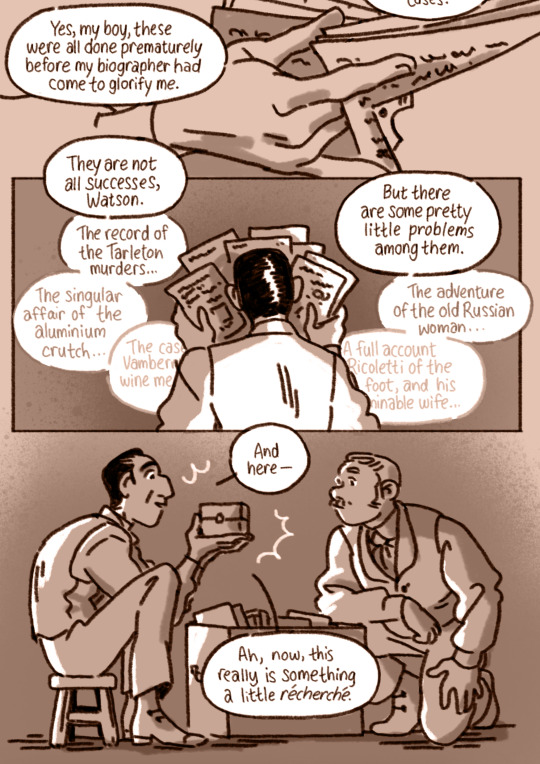
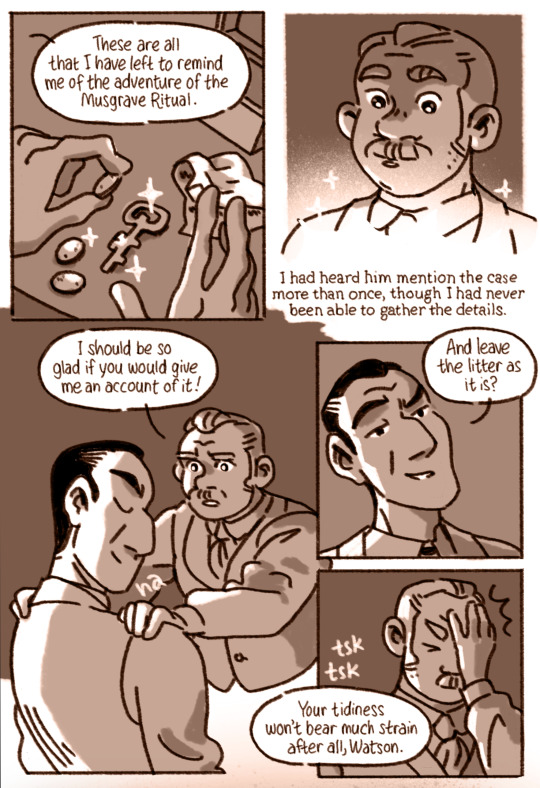
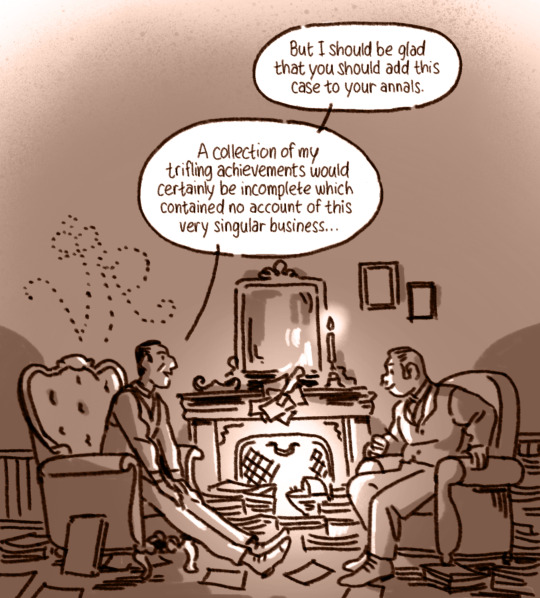
canon text under the cut:
An anomaly which often struck me in the character of my friend Sherlock Holmes was that, although in his methods of thought he was the neatest and most methodical of mankind, and although also he affected a certain quiet primness of dress, he was none the less in his personal habits one of the most untidy men that ever drove a fellow-lodger to distraction. Not that I am in the least conventional in that respect myself. The rough-and-tumble work in Afghanistan, coming on the top of a natural Bohemianism of disposition, has made me rather more lax than befits a medical man. But with me there is a limit, and when I find a man who keeps his cigars in the coal-scuttle, his tobacco in the toe end of a Persian slipper, and his unanswered correspondence transfixed by a jack-knife into the very centre of his wooden mantelpiece, then I begin to give myself virtuous airs. I have always held, too, that pistol practice should be distinctly an open-air pastime; and when Holmes, in one of his queer humors, would sit in an arm-chair with his hair-trigger and a hundred Boxer cartridges, and proceed to adorn the opposite wall with a patriotic V. R. done in bullet-pocks, I felt strongly that neither the atmosphere nor the appearance of our room was improved by it.
Our chambers were always full of chemicals and of criminal relics which had a way of wandering into unlikely positions, and of turning up in the butter-dish or in even less desirable places. But his papers were my great crux. He had a horror of destroying documents, especially those which were connected with his past cases, and yet it was only once in every year or two that he would muster energy to docket and arrange them; for, as I have mentioned somewhere in these incoherent memoirs, the outbursts of passionate energy when he performed the remarkable feats with which his name is associated were followed by reactions of lethargy during which he would lie about with his violin and his books, hardly moving save from the sofa to the table. Thus month after month his papers accumulated, until every corner of the room was stacked with bundles of manuscript which were on no account to be burned, and which could not be put away save by their owner. One winter’s night, as we sat together by the fire, I ventured to suggest to him that, as he had finished pasting extracts into his common-place book, he might employ the next two hours in making our room a little more habitable. He could not deny the justice of my request, so with a rather rueful face he went off to his bedroom, from which he returned presently pulling a large tin box behind him. This he placed in the middle of the floor and, squatting down upon a stool in front of it, he threw back the lid. I could see that it was already a third full of bundles of paper tied up with red tape into separate packages.
“There are cases enough here, Watson,” said he, looking at me with mischievous eyes. “I think that if you knew all that I had in this box you would ask me to pull some out instead of putting others in.”
“These are the records of your early work, then?” I asked. “I have often wished that I had notes of those cases.”
“Yes, my boy, these were all done prematurely before my biographer had come to glorify me.” He lifted bundle after bundle in a tender, caressing sort of way. “They are not all successes, Watson,” said he. “But there are some pretty little problems among them. Here’s the record of the Tarleton murders, and the case of Vamberry, the wine merchant, and the adventure of the old Russian woman, and the singular affair of the aluminium crutch, as well as a full account of Ricoletti of the club-foot, and his abominable wife. And here—ah, now, this really is something a little recherchè.”
He dived his arm down to the bottom of the chest, and brought up a small wooden box with a sliding lid, such as children’s toys are kept in. From within he produced a crumpled piece of paper, and old-fashioned brass key, a peg of wood with a ball of string attached to it, and three rusty old disks of metal.
“Well, my boy, what do you make of this lot?” he asked, smiling at my expression.
“It is a curious collection.”
“Very curious, and the story that hangs round it will strike you as being more curious still.”
“These relics have a history then?”
“So much so that they are history.”
“What do you mean by that?”
Sherlock Holmes picked them up one by one, and laid them along the edge of the table. Then he reseated himself in his chair and looked them over with a gleam of satisfaction in his eyes.
“These,” said he, “are all that I have left to remind me of the adventure of the Musgrave Ritual.”
I had heard him mention the case more than once, though I had never been able to gather the details. “I should be so glad,” said I, “if you would give me an account of it.”
“And leave the litter as it is?” he cried, mischievously. “Your tidiness won’t bear much strain after all, Watson. But I should be glad that you should add this case to your annals, for there are points in it which make it quite unique in the criminal records of this or, I believe, of any other country. A collection of my trifling achievements would certainly be incomplete which contained no account of this very singular business.
-The Memories of Sherlock Holmes: The Musgrave Ritual
#they are so married#also watson describing himself as bohemian#i know what you are#sherlock holmes#acd holmes#acd canon#john watson#my art#musgrave ritual
2K notes
·
View notes
Text
I wonder if any adaptation has ever seriously entertained the "Watson fought in a war overseas, suffered a disabling wound, was discharged, came home, had a bunch of adventures with Holmes, recovered from that wound, re-enlisted, fought in a second war overseas, suffered a different disabling wound, came home again, and just never mentioned the second war in any of his memoirs because he didn't think it would interest his readers" solution to the Sherlock Holmes timeline conundrum.
#media#literature#sherlock holmes#john watson#arthur conan doyle#violence mention#injury mention#this is a serious post
2K notes
·
View notes
Text

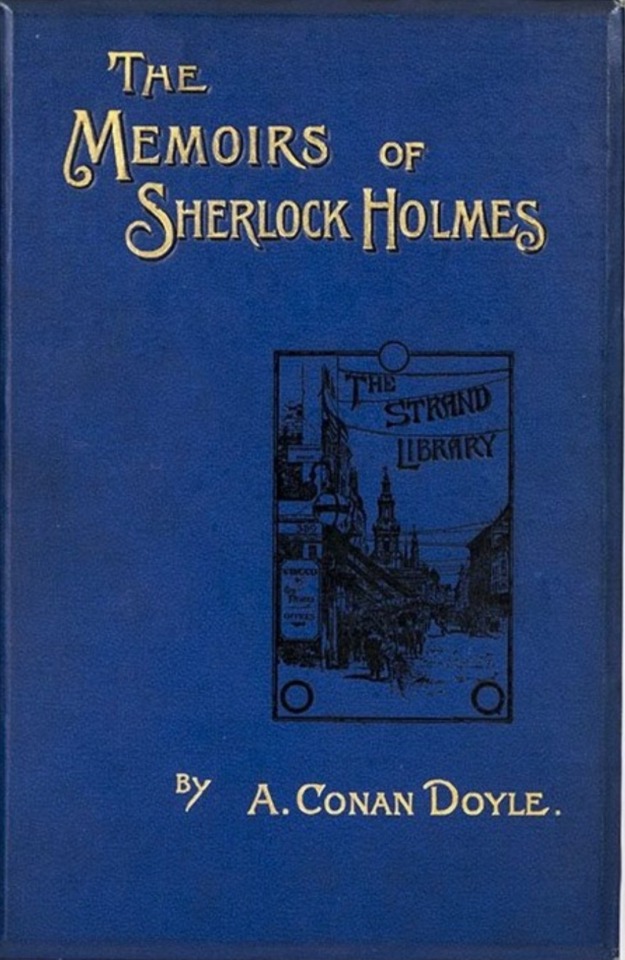
The covers of the first printed editions of "The Adventures of Sherlock Holmes" (1892) and "The Memoirs of Sherlock Holmes" (1894)
#the first ones cover fades so eratically i found like ten different shades in different copies#sherlock holmes#holmes#the adventures of sherlock holmes#acd#sir arthur conan doyle#the strand#vintage books#victorian books#the memoirs of sherlock holmes#the strand library#book cover
16 notes
·
View notes
Text
The New S2 Poster Details
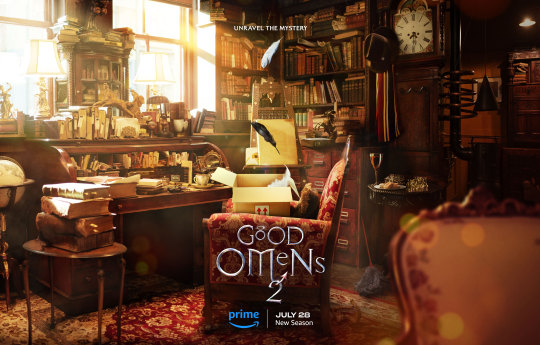

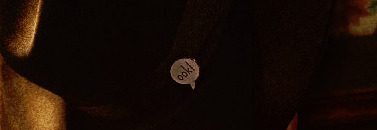
Terry's hat and scarf ❤ With an ook pin! ❤
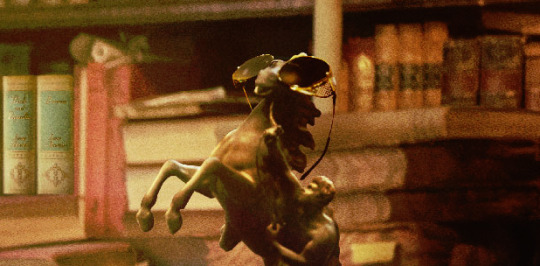
Crowley's old glasses on the statue. The statue itself is the Marly Horses by Guillaume Coustou the Elder.

Aziraphale's bow tie on the floor 👀

The cardboard box - long ago Neil shared on his instagram: Game on! There are mysteries, histories, secrets revealed and Something Too Terrible To Be Revealed on the way. Also a cardboard box.

Three feathers. One white, one blac and one white with a bluish/grey tinge (if it's not a shaddow)?

The angel mug is back 🥰

'The Resurrectionist' matches with skull and crossbones. In the previous poster there was a The Resurrectionist leaflet.
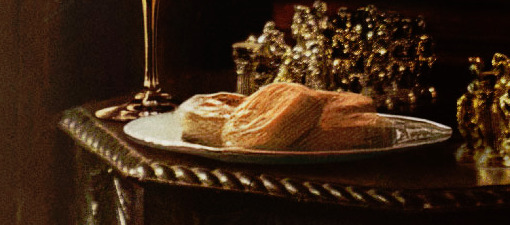
Again the Eccles cakes (already were in the previous poster)
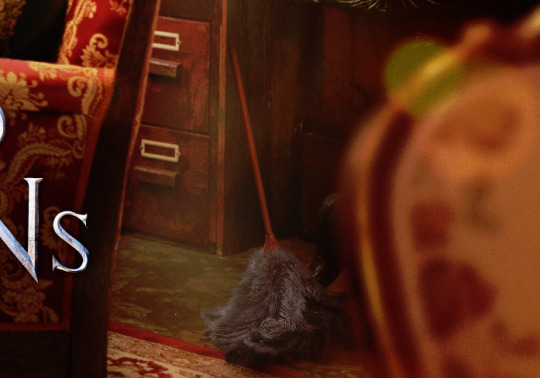
Feather duster with dark gray/black feathers

On this shelf there books also in the previous poster, but at different place 🤔: The Crow Road, Catch-22.
And: The Curious Incident of the Dog in the Night-Time by Mark Haddon, from wikj: mystery novel by nritish writer Mark Haddon. Its title refers to an observation by the fictional detective Sherlock Holmes in the 1892 short story The Adventure of Silver Blaze
And: No Woman No Cry: My Life with Bob Marley by Rita Marley a memoir of Bob Marley by wife, Rita.
Also heard the people say that the right one of the Catch-22 they see Gabriel García Márquez on the spine (I can't read it :)).


Lord Jim and Treasure Island have also been identified in the previous poster but now are in a different place 🤔👀.

Three books by Jane Austen: Persuasion, Pride and Prejudice and Emma. We have already seen Pride and Prejudice in the previous poster but it was a different edition so Aziraphale has more than one :).

Candy?
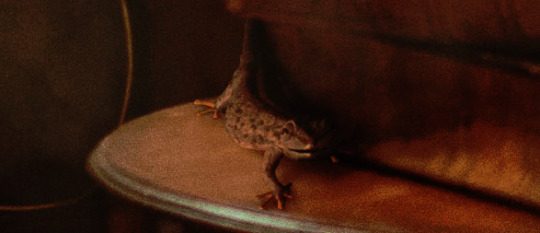

Again geckos! :) 🦎 (there were three in the previous poster)
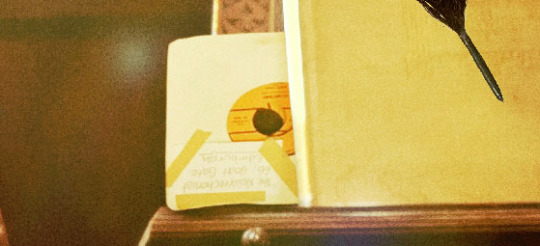
The Buddy Holly Everyday was also in a different place in the previous poster. And there is a note on it
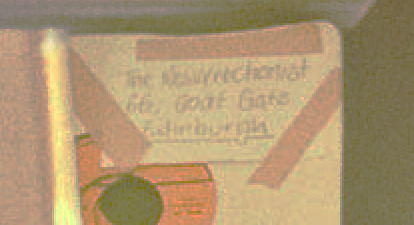
The Ressurectionist, 66. Goat Gate, Edinburgh 👀.
#good omens#gos2#season 2#s2 posters#posters#fun fact#jane austen#pride and prejudice#emma#persuasion#No Woman No Cry: My Life with Bob Marley#rita marley#The Curious Incident of the Dog in the Night-Time#Mark Haddon#The Resurrectionist#cardboard box#terry's hat#terry's scarf#crowley's glasses#aziraphale's bow tie#s2 poster details#goat gate#edinburgh
4K notes
·
View notes
Text
books i read in 2023
my goal was to read a book a week and while the timeline wasn't perfectly even, i did manage to get it to add up (and then some!). this year i focused on religion and philosophy as well as classics (of which im counting both as traditional "ancient or pre-modern famous and outstanding" types of books, but also famous more modern books). i also bolded some books that were really good in my opinion that have really stuck with me so if you are interested in the genre i'd suggest those
st joan by bernard shaw (play)
mary and your everyday life by bernard haring (theology)
theology of liberation by gustavo gutierrez (theology)
magnificat by elizabeth ruth obbard (theology)
piedras labradas by victor montejo (poetry)
the boy who was raised as a dog by bruce perry and maia szalavitz (psychology)
4 great plays by ibsen - the dollhouse, ghosts, the wild duck, and an enemy of the people by henry ibsen (plays obvi)
the night of the iguanas by tennessee williams (play)
being logical by dq mcinerny (idk sociology maybe? it was about recognizing and avoiding bad-faith arguments and logical fallacies)
the alchemist by paolo coelho (classics)
frankenstein by mary shelly (classics)
an american tragedy by theodore dreiser (classics)
is this wifi organic? by dave farina (idk how to classify this one either but it was also about recognizing bad-faith arguments, specifically when it comes to pseudoscience)
the nicaraguan church and the revolution by joseph muligan (theology, history)
catholic social teaching: our best kept secret by peter henriot, edward deberri, and michael schultheis (theology)
beowulf (classics)
sapiens by yuval noah harari (anthropology)
the church and the second sex by mary daly (theology)
mary in the new testament edited by raymond brown, karl donfried, joseph fitzmyer, and john reumann (theology)
a catholic devotion to mary by oscar lukefahr (theology)
1001 nights / arabian nights trans. sir richard burton (classics)
a house on mango street by sandra cisneros (poetry)
primary source readings in catholic church history edited by robert feduccia and nick wagner (theology)
doing faithjustice by fred kammer, sj (theology)
winds of change by isaac asimov (sci-fi)
the sound and the fury by william faulkner (classics)
una ciudad de la españa cristiana hace mil años by claudio sanchez-albornoz (history)
the glass menajerie by tennessee williams (play)
reinventing the enemy's language by joy harjo and gloria bird (indigenous women writers anthology)
the great gatsby by f scott fitzgerald *reread* (classics)
the bell jar by sylvia plath (classics)
the kite runner by khaled hosseini (classics)
one nation, under gods by peter manseau (history)
development as freedom by amartya sen (economic / political philosophy)
women in ministry: four views edited by bonnidell and robert g clouse (practical theology)
mother of god: a history of the virgin mary by miri rubin (theology / history)
a study in scarlet and the sign of four by sir arthur conan doyle (classics)
adventures of sherlock holmes by sir arthur conan doyle (classics)
the casebook of sherlock holmes by sir arthur conan doyle (classics)
the valley of fear by sir arthur conan doyle (classics)
the memoirs of sherlock holmes by sir arthur conan doyle (classics)
the return of sherlock holmes by sir arthur conan doyle (classics)
the hound of the baskervilles by sir arthur conan doyle (classics)
his last bow by sir arthur conan doyle (classics)
the fundamentals of ethics, fourth edition by russ shafer landau (philosophy)
dracula by bram stoker (classics) (yes i'm counting dracula daily)
desde mi silencio by carmen gomez (poetry)
happiness in this life, excerpts from the homilies of pope francis (theology)
the vigilante / the snake / the chrysanthemums by john steinbeck (classics)
quest for the living god by sister beth johnson *reread* (theology)
the adventures of tom sawyer by mark twain (classics)
the adventures of huckleberry finn by mark twain (classics)
the boys in the boat by daniel james brown (history)
and that's all folks, ending the year with some classics, plus my mom insisted i read the boys in the boat while im home for christmas because she wanted to see the movie lol. i got so many books for christmas so i'll be startin off strong next year too, and my goal is finishing my collection of john steinbeck, by which i mean obtaining as well as reading everything i can find by him. here's my list from 2022 and i'll see you next year
#books#bookblr#reading#literature#classic lit#john steinbeck#philosophy#religion#classics#sherlock holmes#mystery#psychology#theology#history#poetry#sociology
22 notes
·
View notes
Text
BTW, for your reading records, Letters From Watson has now finished The Adventures of Sherlock Holmes, The Memoirs of Sherlock Holmes, and The Return of Sherlock Holmes. We are two stories away from finishing His Last Bow, and we have six stories left of The Case-Book of Sherlock Holmes.
As of the 19th of November, we have read 48 out of the 56 short stories in the Sherlock Holmes canon.
We have read all of ACD’s favourite stories. Our next story is The Illustrious Client.
#sherlock holmes#letters from watson#sorry i fell off keeping track of this lol#i have uhhhhh life and also adhd
28 notes
·
View notes
Text
How many have you read?
The BBC estimates that most people will only read 6 books out of the 100 listed below. Bold the titles you’ve read.
1 Pride and Prejudice - Jane Austen
2 Lord of the Rings - J. R. R. Tolkein
3 Jane Eyre – Charlotte Bronte
4 Harry Potter series
5 To Kill a Mockingbird - Harper Lee
6 The Bible
7 Wuthering Heights – Emily Bronte
8 Nineteen Eighty Four – George Orwell
9 His Dark Materials – Philip Pullman
10 Great Expectations – Charles Dickens
11 Little Women – Louisa M Alcott
12 Tess of the D’Urbervilles – Thomas Hardy
13 Catch 22 – Joseph Heller
14 Complete Works of Shakespeare
15 Rebecca – Daphne Du Maurier
16 The Hobbit – JRR Tolkien
17 Birdsong – Sebastian Faulks
18 Catcher in the Rye - J. D. Salinger
19 The Time Traveller’s Wife - Audrey Niffeneger
20 Middlemarch – George Eliot
21 Gone With The Wind – Margaret Mitchell
22 The Great Gatsby – F Scott Fitzgerald
23 Bleak House – Charles Dickens
24 War and Peace – Leo Tolstoy
25 The Hitch Hiker’s Guide to the Galaxy – Douglas Adams
26 Brideshead Revisited – Evelyn Waugh
27 Crime and Punishment – Fyodor Dostoyevsky
28 Grapes of Wrath – John Steinbeck
29 Alice in Wonderland – Lewis Carroll
30 The Wind in the Willows – Kenneth Grahame
31 Anna Karenina – Leo Tolstoy
32 David Copperfield – Charles Dickens
33 Chronicles of Narnia – CS Lewis
34 Emma – Jane Austen
35 Persuasion – Jane Austen
36 The Lion, The Witch and The Wardrobe – CS Lewis
37 The Kite Runner - Khaled Hosseini
38 Captain Corelli’s Mandolin - Louis De Bernieres
39 Memoirs of a Geisha – Arthur Golden
40 Winnie the Pooh – AA Milne
41 Animal Farm – George Orwell
42 The Da Vinci Code – Dan Brown
43 One Hundred Years of Solitude – Gabriel Garcia Marquez
44 A Prayer for Owen Meaney – John Irving
45 The Woman in White – Wilkie Collins
46 Anne of Green Gables – LM Montgomery
47 Far From The Madding Crowd – Thomas Hardy
48 The Handmaid’s Tale – Margaret Atwood
49 Lord of the Flies – William Golding
50 Atonement – Ian McEwan
51 Life of Pi – Yann Martel
52 Dune – Frank Herbert
53 Cold Comfort Farm – Stella Gibbons
54 Sense and Sensibility – Jane Austen
55 A Suitable Boy – Vikram Seth
56 The Shadow of the Wind – Carlos Ruiz Zafon
57 A Tale Of Two Cities – Charles Dickens
58 Brave New World – Aldous Huxley
59 The Curious Incident of the Dog in the Night-time – Mark Haddon
60 Love In The Time Of Cholera – Gabriel Garcia Marquez
61 Of Mice and Men – John Steinbeck
62 Lolita – Vladimir Nabokov
63 The Secret History – Donna Tartt
64 The Lovely Bones - Alice Sebold
65 Count of Monte Cristo – Alexandre Dumas
66 On The Road – Jack Kerouac
67 Jude the Obscure – Thomas Hardy
68 Bridget Jones’s Diary – Helen Fielding
69 Midnight’s Children – Salman Rushdie
70 Moby Dick – Herman Melville
71 Oliver Twist – Charles Dickens
72 Dracula – Bram Stoker
73 The Secret Garden – Frances Hodgson Burnett
74 Notes From A Small Island – Bill Bryson
75 Ulysses – James Joyce
76 The Bell Jar – Sylvia Plath
77 Swallows and Amazons - Arthur Ransome
78 Germinal – Emile Zola
79 Vanity Fair – William Makepeace Thackeray
80 Possession – AS Byatt
81 A Christmas Carol – Charles Dickens
82 Cloud Atlas – David Mitchel
83 The Color Purple – Alice Walker
84 The Remains of the Day – Kazuo Ishiguro
85 Madame Bovary – Gustave Flaubert
86 A Fine Balance – Rohinton Mistry
87 Charlotte’s Web – EB White
88 The Five People You Meet In Heaven – Mitch Albom
89 Adventures of Sherlock Holmes – Sir Arthur Conan Doyle
90 The Faraway Tree Collection – Enid Blyton
91 Heart of Darkness – Joseph Conrad
92 The Little Prince – Antoine De Saint-Exupery
93 The Wasp Factory – Iain Banks
94 Watership Down – Richard Adams
95 A Confederacy of Dunces – John Kennedy Toole
96 A Town Like Alice – Nevil Shute
97 The Three Musketeers – Alexandre Dumas
98 Hamlet – William Shakespeare
99 Charlie and the Chocolate Factory – Roald Dahl
100 Les Miserables – Victor Hugo
As found in the original post I saw by @macrolit
My total: 43/100
#tear-chan talks#reading and stuff#damn this is both more and less than I expected haha#this tells me I should probably read more Dickens#also some of these I read in Spanish so...
80 notes
·
View notes